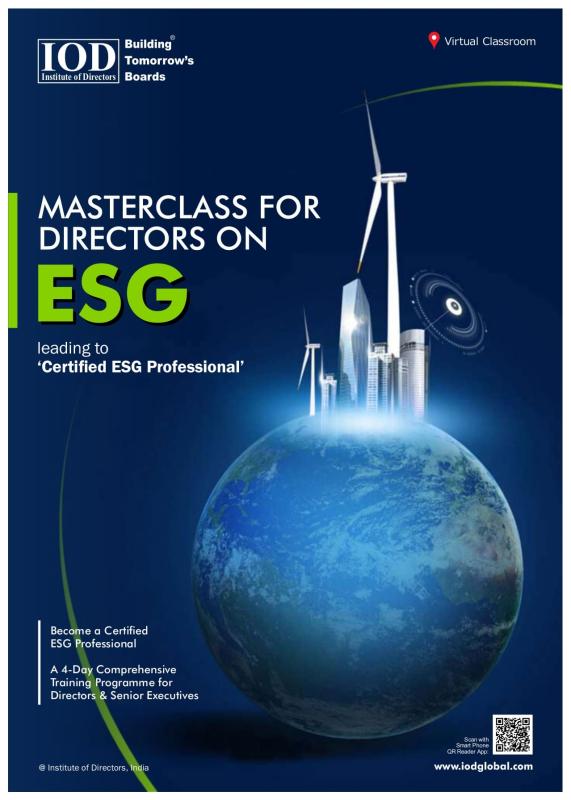How Directors Can Drive Corporate Sustainability Through ESG Leadership

In today's rapidly evolving business landscape,
environmental, social, and governance (ESG) criteria have become crucial for
directors aiming to drive corporate sustainability and ensure long-term
success. Here's how directors can effectively leverage ESG leadership to steer
their organizations towards sustainable growth, underpinned by targeted ESG
training & course initiatives:
Understanding ESG and Its Relevance
1. Defining ESG: ESG stands for Environmental,
Social, and Governance. These three broad categories help stakeholders evaluate
how far advanced companies are with sustainability. Understanding these factors
is crucial for directors to implement strategies that align with global
sustainability standards.
2. Why ESG Matters: In an era where transparency is
valued by consumers, investors, and regulatory bodies alike, ESG metrics
provide insights into a company’s operational efficiency, risk management, and
ethical practices. Companies strong in ESG are typically better positioned to
mitigate risks and capitalize on opportunities, leading to enhanced market
credibility and potentially higher financial returns.
Strategic Implementation of ESG Practices
3. Integrating ESG into Corporate Strategy: Directors
can drive sustainability by ensuring that ESG considerations are woven into the
fabric of corporate strategies. This involves setting clear, actionable goals
related to environmental impacts, social contributions, and ethical governance
that support the overall business objectives.
4. ESG and Risk Management: Understanding the
interplay between ESG factors and business risk is vital. Directors should
advocate for regular ESG risk assessments to identify and mitigate potential
environmental liabilities, social backlash, or governance failures that could
affect the company.
5. Reporting and Transparency: Directors can champion
transparency by promoting comprehensive ESG reporting. This not only complies
with increasing regulatory demands but also builds trust with stakeholders.
Transparent reporting practices ensure that all interested parties are aware of
the company's efforts and progress in meeting ESG goals.
Leadership and Culture
6. Leading by Example: ESG leadership requires directors
to not only oversee but actively participate in sustainability initiatives.
This could include leading by example in reducing carbon footprints, enhancing
diversity and inclusion within the company, and maintaining ethical
transparency.
7. Cultivating an ESG-centric Culture: To truly
integrate ESG into a company’s DNA, directors must foster a culture that values
sustainability at all levels of the organization. This involves training,
educating, and empowering employees to take ownership of ESG initiatives.
Engaging Stakeholders
8. Stakeholder Engagement: Effective ESG leadership
involves engaging with all stakeholders, including investors, customers,
employees, and the communities where the business operates. Directors should
facilitate open dialogues to gather insights and communicate the company's
commitment to ESG principles.
9. Partnering for Progress: Directors can enhance
their company's sustainability by partnering with other organizations that
share similar ESG values. These partnerships can lead to shared resources,
enhanced innovation, and stronger impact in sustainability efforts.
Measuring Impact and Continuous Improvement
10. Setting Metrics and KPIs: It’s essential to
measure the impact of ESG initiatives accurately. Directors should establish
specific metrics and key performance indicators (KPIs) to track progress
against ESG objectives regularly.
11. Learning and Adapting: Sustainability is a
dynamic field, and what works today may not be sufficient tomorrow. Directors
must stay informed about the latest developments in ESG standards and
practices, continuously adapting strategies to meet evolving requirements and
stakeholder expectations.
Conclusion
By embracing ESG leadership, directors not only contribute
to the planet and society but also build a resilient, future-oriented business.
The journey towards sustainability is complex and challenging, but with
strategic focus and proactive leadership, directors can indeed turn ESG
principles into a competitive advantage, fostering long-term growth and
sustainability.
Comments